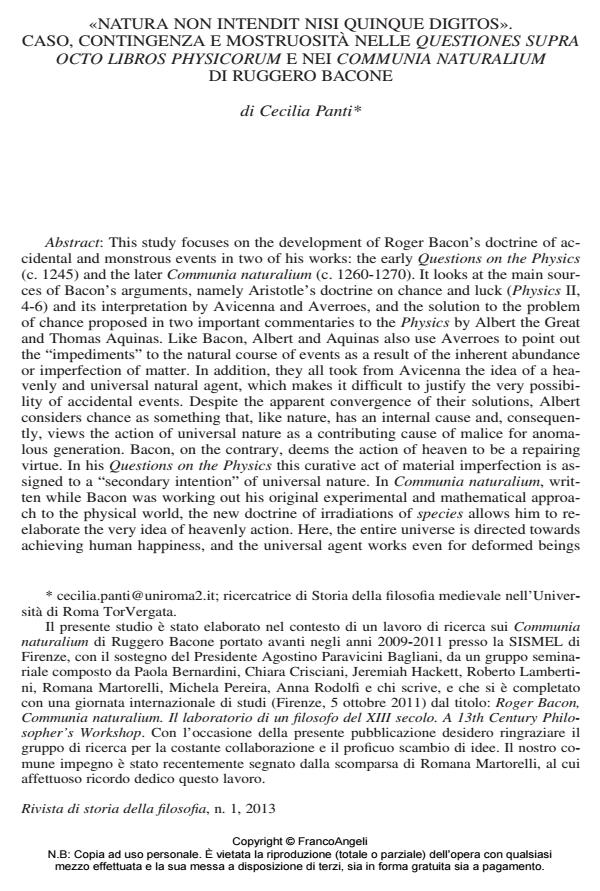"Natura non intendit nisi quinque digitos". Caso, contingenza e mostruosità nelle questiones supra octo libros physicorum e nei communia naturalium di Ruggero Bacone
Titolo Rivista RIVISTA DI STORIA DELLA FILOSOFIA
Autori/Curatori Cecilia Panti
Anno di pubblicazione 2013 Fascicolo 2013/1
Lingua Italiano Numero pagine 30 P. 65-94 Dimensione file 545 KB
DOI 10.3280/SF2013-001005
Il DOI è il codice a barre della proprietà intellettuale: per saperne di più
clicca qui
Qui sotto puoi vedere in anteprima la prima pagina di questo articolo.
Se questo articolo ti interessa, lo puoi acquistare (e scaricare in formato pdf) seguendo le facili indicazioni per acquistare il download credit. Acquista Download Credits per scaricare questo Articolo in formato PDF

FrancoAngeli è membro della Publishers International Linking Association, Inc (PILA), associazione indipendente e non profit per facilitare (attraverso i servizi tecnologici implementati da CrossRef.org) l’accesso degli studiosi ai contenuti digitali nelle pubblicazioni professionali e scientifiche.
This study focuses on the development of Roger Bacon’s doctrine of accidental and monstrous events in two of his works: the early Questions on the Physics (c. 1245) and the later Communia naturalium (c. 1260-1270). It looks at the main sources of Bacon’s arguments, namely Aristotle’s doctrine on chance and luck (Physics II, 4-6) and its interpretation by Avicenna and Averroes, and the solution to the problem of chance proposed in two important commentaries to the Physics by Albert the Great and Thomas Aquinas. Like Bacon, Albert and Aquinas also use Averroes to point out the "impediments" to the natural course of events as a result of the inherent abundance or imperfection of matter. In addition, they all took from Avicenna the idea of a heavenly and universal natural agent, which makes it difficult to justify the very possibility of accidental events. Despite the apparent convergence of their solutions, Albert considers chance as something that, like nature, has an internal cause and, consequently, views the action of universal nature as a contributing cause of malice for anomalous generation. Bacon, on the contrary, deems the action of heaven to be a repairing virtue. In his Questions on the Physics this curative act of material imperfection is assigned to a "secondary intention" of universal nature. In Communia naturalium, written while Bacon was working out his original experimental and mathematical approach to the physical world, the new doctrine of irradiations of species allows him to reelaborate the very idea of heavenly action. Here, the entire universe is directed towards achieving human happiness, and the universal agent works even for deformed beings to make them as far as possible complete. This determines the very founding of a natural science able to include individuality and singularity as true objects of scientific knowledge in opposition to the Aristotelian idea, most closely adhered to by Albert and Aquinas, that science concerns universals.
Parole chiave:Nature, monstrosity, chance, contingency, Roger Bacon, Albertus Magnus, Aristotle, Avicenna, Averroes.
Cecilia Panti, "Natura non intendit nisi quinque digitos". Caso, contingenza e mostruosità nelle questiones supra octo libros physicorum e nei communia naturalium di Ruggero Bacone in "RIVISTA DI STORIA DELLA FILOSOFIA" 1/2013, pp 65-94, DOI: 10.3280/SF2013-001005